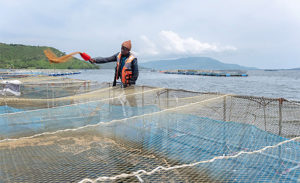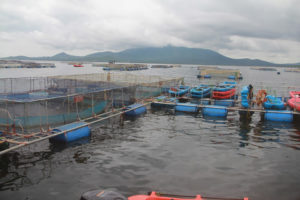From the author: Johns Hopkins-led study explore sector responses to COVID-19

As we enter the second year of the pandemic, many aquaculture producers are still taking things one day at a time. For Sarah Benhamo, deputy commercial director at Victory Farms, which raises tilapia in cages in Lake Victoria, Kenya, businesses and people are mostly focused on staying safe.
“We don’t have a time frame for when COVID is going to be completely out of our lives,” Benhamo told me recently. “Basically, businesses and people are trying to figure out how to continue with their daily lives.”
Some challenges facing tilapia farmers in Lake Victoria are unique to the region of East Africa, but many others are shared by aquaculture producers around the world. Benhamo’s experience with Victory Farms is echoed in a recent study led by researchers at the Johns Hopkins Center for a Livable Future in the Bloomberg School of Public Health.
The study examines how seafood-related actors, businesses, and institutions are responding to the pandemic: There are many challenges facing the seafood sector while the pandemic continues to spread. As lead author, I hope our research can share some early lessons and jump-start the learning process so businesses can adapt and become more resilient to future shocks.
Farms are facing greater uncertainty about the future and trying new ways to market products in the face of shifting consumer demand. Farms see an increased cost of doing business and keeping a constant focus on worker safety while remaining open.
https://www.aquaculturealliance.org/advocate/technology-allowing-aquaculture-to-do-social-distancing/
Many countries have deemed workers in aquaculture and fisheries sectors as “essential” workers, as they provide food security for consumers, but also livelihoods for workers.
Victory Farms has, however, done better than most during the ongoing pandemic. After seeing Europe hit hard in early 2020, the company reacted swiftly by importing extra feed ahead of possible border closures.

And, as the pandemic moved to Africa, it added safety measures for on-site staff, moved non-essential workers offsite and limited visitors. The farm also secured government permits for workers to travel during nightly curfews, a public health measure that has frustrated local fishermen.
“Victory Farms has really helped our community by providing food and employing out of work fishermen,” said Benhamo. People like Sarah have important stories to share as they learn how to adapt to life in a pandemic.
Benhamo joined me and other panelists to discuss COVID-19 impacts and responses in Africa, Asia, Europe and the Americas in a recent webinar hosted by Dave Little at Stirling University. To learn more about resilience building in the aquaculture and fisheries sectors, you can find more resources here.
Follow the Advocate on Twitter @GAA_Advocate
Now that you've finished reading the article ...
… we hope you’ll consider supporting our mission to document the evolution of the global aquaculture industry and share our vast network of contributors’ expansive knowledge every week.
By becoming a Global Seafood Alliance member, you’re ensuring that all of the pre-competitive work we do through member benefits, resources and events can continue. Individual membership costs just $50 a year. GSA individual and corporate members receive complimentary access to a series of GOAL virtual events beginning in April. Join now.
Not a GSA member? Join us.
Author
-

Dave Love, Ph.D.
Associate Scientist
Center for a Livable Future
Johns Hopkins Bloomberg School of Public Health
Dave’s work focuses on environmental health and food systems with a focus on the fisheries and aquaculture sectors. He engages in a wide range of food-related topics including food safety, value chains, food waste, veterinary drugs and antimicrobial resistance. Dave currently resides in Asheville, North Carolina, USA. Follow him on Twitter (@davelove1).
Related Posts

Intelligence
India’s shrimp industry adapts to COVID-19 restrictions
A look at trends in various segments of the shrimp production supply chain in India – hatcheries, farms, feeds and exports – amid COVID-19 restrictions.

Responsibility
‘Model’ tilapia venture shows mettle in Mozambique
On the shores of Lake Cahora Bassa, Chicoa Fish Farm hopes to create a ripple effect to improve fish supply and quality of life for an impoverished region.

Health & Welfare
Uncharted waters: Kenya takes dramatic leap in aquaculture
Kenya's economic stimulus program includes a bold move to help the country’s small-scale farmers literally dig themselves out of poverty with fish ponds.

Innovation & Investment
Investing in Africa’s aquaculture future, part 1
What is the future that Africa wants? Views on how to grow aquaculture on the continent vary widely, but no one disputes the notion that food security, food safety, income generation and job creation all stand to benefit.

